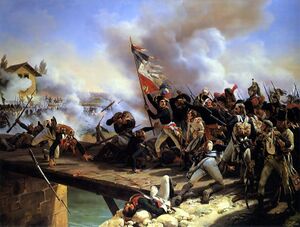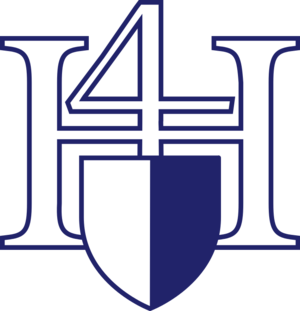Many thanks to our Patrons who cover ~2/3 of our hosting bill. Please join them if you can.
1796
Jump to navigation
Jump to search
1786 < 1787 < 1788 < 1789 < 1790 < 1791 < 1792 <1793 < 1794 < 1795 < 1796 > 1797 > 1798 > 1799 > 1800 > 1801 > 1802 > 1803 > 1804 > 1805 > 1806
 Napoleon Bonaparte forces a crossing of the bridge at Arcole, a move that makes his career. | |
| year 1796 |
Events
- January 16 – The first Dutch (and general) elections are held for the National Assembly of the Batavian Republic. (The next Dutch general elections are held in 1888.)
- February 15 – French Revolutionary Wars: The Invasion of Ceylon (1795) ends when Johan van Angelbeek, the Batavian governor of Ceylon, surrenders Colombo peacefully to British forces.
- February 16 – The Kingdom of Great Britain is granted control of Ceylon by the Dutch.
- March 9 – Widow Joséphine de Beauharnais marries General Napoléon Bonaparte.
- March 20 – The U.S. House of Representatives demands that the U.S. State Department supply it with documents relating to the negotiation of the Jay Treaty; President Washington declines the request, citing that only the U.S. Senate has jurisdiction over treaties.
- March 26 – Napoleon Bonaparte arrives at Nice to take command of the Army of Italy (37,000 men and 60 guns), which is scattered in detachments as far as Genoa.
- April 12 – War of the First Coalition – Battle of Montenotte: Napoleon Bonaparte gains his first victory as an army commander.
- May 10 War of the First Coalition – Battle of Lodi: General Napoleon Bonaparte defeats the Austrian rearguard, in forcing a crossing of the bridge over the Adda River in Italy. The Austrians lose some 2,000 men, 14 guns, and 30 ammunition wagons.
- May 14 – Edward Jenner administers the first smallpox vaccination, in England.
- May 15 – Napoleon's troops take Milan.
- June 23 – Napoleon Bonaparte seizes the Papal States, which become part of the revolutionary Cisalpine Republic. Pope Pius VI signs the Armistice of Bologna, and is forced to pay a contribution (34 million francs).
- July 11 – The United States takes possession of Detroit from Great Britain, under the terms of the Jay Treaty.
- July 21 – Mungo Park reaches Ségou, the capital of the Bamana Empire.
- August 19 – Second Treaty of San Ildefonso: Spain and France form an alliance against Great Britain.
- September 2 – Jewish emancipation in the Batavian Republic (Netherlands).
- September 17 – U.S. President George Washington issues his Farewell Address, which warns against partisan politics and foreign entanglements. In addition, he sets a precedent by declining to run for a third term.
- September 28 – Empress Catherine the Great signs an agreement with Great Britain, formally joining Russia to the coalition.
- November 3 – John Adams defeats Thomas Jefferson, in the U.S. presidential election.
- November 6 - Catherine the Great dies, and is succeeded by her son Paul I of Russia. His wife Sophie Marie Dorothea of Württemberg becomes Empress consort.
- November 17 – Battle of Arcole: French forces under General Napoleon defeat the Austrians at Arcole. After a bold maneuver, he outflanks the Austrian army (24,000 men) under Freiherr József Alvinczi, and cuts off its line of retreat. Alvinczi is forced to take up a defensive position behind the Brenta River.
- December – The British government begins work on a 40-acre (162,000 m²) site at Norman Cross, for the world's first purpose-built prisoner-of-war camp.[1]
- December 7 – The U.S. Electoral College meets to elect John Adams president of the United States.
Date unknown
- The Spanish government lifts the restrictions against neutrals trading with the colonies, thus acknowledging Spain's inability to supply the colonies with needed goods and markets.
- Annual British iron production reaches 125,000 tons.
Event
| Event | Start | End | Description |
|---|---|---|---|
| French Revolution | 5 May 1789 | 9 November 1799 | Often cited event in world history that has an even more brutal side to it than is usually discussed. |
New Groups
| Group | Image | Type | Description |
|---|---|---|---|
| University of Strathclyde |  | Public | Glasgow's second-oldest university |
| Lycée Henri-IV |  | Considered one of the most demanding and prestigious secondary schools in France. |
Many thanks to our Patrons who cover ~2/3 of our hosting bill. Please join them if you can.
References
- ↑ Charters, Erica; Rosenhaft, Eve; Smith, Hannah (2012). Civilians and War in Europe, 1618-1815